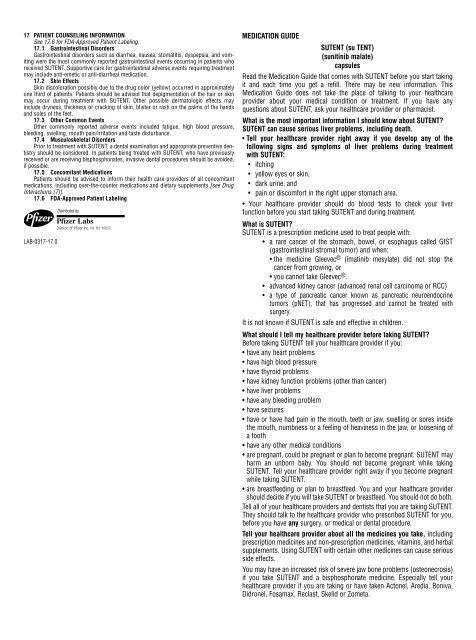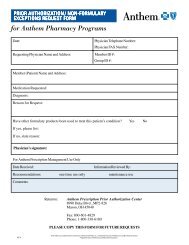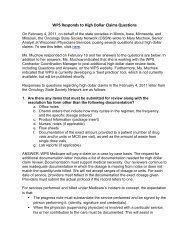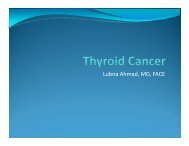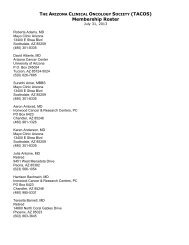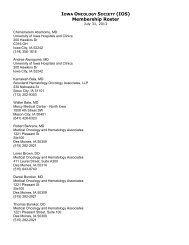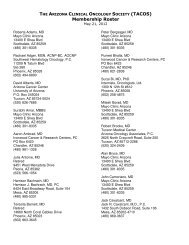2013 Patient Assistance and Reimbursement Guide - Association of ...
2013 Patient Assistance and Reimbursement Guide - Association of ...
2013 Patient Assistance and Reimbursement Guide - Association of ...
Create successful ePaper yourself
Turn your PDF publications into a flip-book with our unique Google optimized e-Paper software.
17 PATIENT COUNSELING INFORMATION<br />
See 17.6 for FDA-Approved <strong>Patient</strong> Labeling.<br />
17.1 Gastrointestinal Disorders<br />
Gastrointestinal disorders such as diarrhea, nausea, stomatitis, dyspepsia, <strong>and</strong> vomiting<br />
were the most commonly reported gastrointestinal events occurring in patients who<br />
received SUTENT. Supportive care for gastrointestinal adverse events requiring treatment<br />
may include anti-emetic or anti-diarrheal medication.<br />
17.2 Skin Effects<br />
Skin discoloration possibly due to the drug color (yellow) occurred in approximately<br />
one third <strong>of</strong> patients. <strong>Patient</strong>s should be advised that depigmentation <strong>of</strong> the hair or skin<br />
may occur during treatment with SUTENT. Other possible dermatologic effects may<br />
include dryness, thickness or cracking <strong>of</strong> skin, blister or rash on the palms <strong>of</strong> the h<strong>and</strong>s<br />
<strong>and</strong> soles <strong>of</strong> the feet.<br />
17.3 Other Common Events<br />
Other commonly reported adverse events included fatigue, high blood pressure,<br />
bleeding, swelling, mouth pain/irritation <strong>and</strong> taste disturbance.<br />
17.4 Musculoskeletal Disorders<br />
Prior to treatment with SUTENT, a dental examination <strong>and</strong> appropriate preventive dentistry<br />
should be considered. In patients being treated with SUTENT, who have previously<br />
received or are receiving bisphosphonates, invasive dental procedures should be avoided,<br />
if possible.<br />
17.5 Concomitant Medications<br />
<strong>Patient</strong>s should be advised to inform their health care providers <strong>of</strong> all concomitant<br />
medications, including over-the-counter medications <strong>and</strong> dietary supplements [see Drug<br />
Interactions (7)].<br />
17.6 FDA-Approved <strong>Patient</strong> Labeling<br />
LAB-0317-17.0<br />
Distributed by<br />
Pfizer Labs<br />
Division <strong>of</strong> Pfizer Inc, NY, NY 10017<br />
MEDICATION GUIDE<br />
SUTENT (su TENT)<br />
(sunitinib malate)<br />
capsules<br />
Read the Medication <strong>Guide</strong> that comes with SUTENT before you start taking<br />
it <strong>and</strong> each time you get a refill. There may be new information. This<br />
Medication <strong>Guide</strong> does not take the place <strong>of</strong> talking to your healthcare<br />
provider about your medical condition or treatment. If you have any<br />
questions about SUTENT, ask your healthcare provider or pharmacist.<br />
What is the most important information I should know about SUTENT<br />
SUTENT can cause serious liver problems, including death.<br />
• Tell your healthcare provider right away if you develop any <strong>of</strong> the<br />
following signs <strong>and</strong> symptoms <strong>of</strong> liver problems during treatment<br />
with SUTENT:<br />
• itching<br />
• yellow eyes or skin,<br />
• dark urine, <strong>and</strong><br />
• pain or discomfort in the right upper stomach area.<br />
• Your healthcare provider should do blood tests to check your liver<br />
function before you start taking SUTENT <strong>and</strong> during treatment.<br />
What is SUTENT<br />
SUTENT is a prescription medicine used to treat people with:<br />
• a rare cancer <strong>of</strong> the stomach, bowel, or esophagus called GIST<br />
(gastrointestinal stromal tumor) <strong>and</strong> when:<br />
• the medicine Gleevec ® (imatinib mesylate) did not stop the<br />
cancer from growing, or<br />
• you cannot take Gleevec ® .<br />
• advanced kidney cancer (advanced renal cell carcinoma or RCC)<br />
• a type <strong>of</strong> pancreatic cancer known as pancreatic neuroendocrine<br />
tumors (pNET), that has progressed <strong>and</strong> cannot be treated with<br />
surgery.<br />
It is not known if SUTENT is safe <strong>and</strong> effective in children.<br />
What should I tell my healthcare provider before taking SUTENT<br />
Before taking SUTENT tell your healthcare provider if you:<br />
• have any heart problems<br />
• have high blood pressure<br />
• have thyroid problems<br />
• have kidney function problems (other than cancer)<br />
• have liver problems<br />
• have any bleeding problem<br />
• have seizures<br />
• have or have had pain in the mouth, teeth or jaw, swelling or sores inside<br />
the mouth, numbness or a feeling <strong>of</strong> heaviness in the jaw, or loosening <strong>of</strong><br />
a tooth<br />
• have any other medical conditions<br />
• are pregnant, could be pregnant or plan to become pregnant. SUTENT may<br />
harm an unborn baby. You should not become pregnant while taking<br />
SUTENT. Tell your healthcare provider right away if you become pregnant<br />
while taking SUTENT.<br />
• are breastfeeding or plan to breastfeed. You <strong>and</strong> your healthcare provider<br />
should decide if you will take SUTENT or breastfeed. You should not do both.<br />
Tell all <strong>of</strong> your healthcare providers <strong>and</strong> dentists that you are taking SUTENT.<br />
They should talk to the healthcare provider who prescribed SUTENT for you,<br />
before you have any surgery, or medical or dental procedure.<br />
Tell your healthcare provider about all the medicines you take, including<br />
prescription medicines <strong>and</strong> non-prescription medicines, vitamins, <strong>and</strong> herbal<br />
supplements. Using SUTENT with certain other medicines can cause serious<br />
side effects.<br />
You may have an increased risk <strong>of</strong> severe jaw bone problems (osteonecrosis)<br />
if you take SUTENT <strong>and</strong> a bisphosphonate medicine. Especially tell your<br />
healthcare provider if you are taking or have taken Actonel, Aredia, Boniva,<br />
Didronel, Fosamax, Reclast, Skelid or Zometa.


